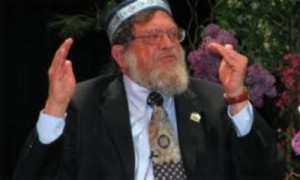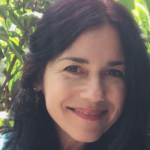“I simply cannot understand how somebody can be a spiritual being and not be actively involved in transforming the world,” says Rabbi Michael Lerner Ph.D..  Political revolutionary, humanitarian, spiritual mentor, psychologist, and editor of Tikkun magazine, Michael Lerner is a powerful voice for radical change in this new millennium. His indefatigable commitment to transform this world from one dominated by ego-centered, mean-spirited, materialistic values to one rooted in the spiritual revelation that we are all one indivisible whole is inspiring, to say the least. He is a passionate man whose deeply compassionate call to awaken to the truth of our undivided spiritual nature is inseparable from his plea for us all to awaken to our own conscience. Rabbi Lerner is an idealist who is actively engaged, not only philosophically but practically, inhow we can actually transform this world that seems to be heading toward disaster. With his uncompromising demand for a comprehensive transformation of society and culture informed by deep spiritual values, his contribution to our investigation of the question, “Can enlightenment save the world?” seemed to be invaluable.
Political revolutionary, humanitarian, spiritual mentor, psychologist, and editor of Tikkun magazine, Michael Lerner is a powerful voice for radical change in this new millennium. His indefatigable commitment to transform this world from one dominated by ego-centered, mean-spirited, materialistic values to one rooted in the spiritual revelation that we are all one indivisible whole is inspiring, to say the least. He is a passionate man whose deeply compassionate call to awaken to the truth of our undivided spiritual nature is inseparable from his plea for us all to awaken to our own conscience. Rabbi Lerner is an idealist who is actively engaged, not only philosophically but practically, inhow we can actually transform this world that seems to be heading toward disaster. With his uncompromising demand for a comprehensive transformation of society and culture informed by deep spiritual values, his contribution to our investigation of the question, “Can enlightenment save the world?” seemed to be invaluable.
Lerner was deeply inspired in his youth by Abraham Heschel, one of modernity’s greatest Jewish theologians. A radical while he studied philosophy at U.C. Berkeley in the sixties, Lerner ultimately decided that the liberal and progressive movements were defeating themselves because they were not addressing the ethical and spiritual dimensions of the human experience. He went on to get his second Ph.D. in clinical psychology and founded the Institute for Labor and Mental Health where, as a psychotherapist, he realized that many working-class people were “moving to the right because the liberals didn’t seem to understand or address the alienation and meaninglessness fostered by the me-firstism of the market economy.” A tireless political activist, he also became a leading figure in the Jewish Renewal movement. Eventually deciding that liberals needed a “politics of meaning,” and that Judaism had the foundations for such a politics, he founded Tikkunmagazine in 1986. In 1993 Lerner achieved national fame when the Washington Post dubbed him “guru of the White House” during his short-lived association with the Clintons, who had been inspired by his influential book The Politics of Meaning. In 1996 he was ordained by Rabbi Zalman Schachter-Shalomi and founded BeytTikkun Synagogue in San Francisco.
Being a spiritual teacher myself, I found Rabbi Lerner’s uncompromising views refreshing to hear. In our Western spiritual marketplace—where more often than not the endless fears and desires of the ego are assuaged rather than honestly challenged, where the always profound implications of spiritual experience are endlessly watered down—his intolerance for materialism and for those approaches to spiritual transformation that are ultimately only self-serving is an important wake-up call. While I agreed with Lerner’s emphatic declaration that spiritual evolution should result in active transformation of the world, the automatic association of the spiritual and the fiercely political was not always as obvious to me as it was to him.
An unstoppable hurricane of compassionate concern, Rabbi Lerner compels each and every one of us to question the actual depth of our commitment to our own highest convictions. This lively interview was conducted in his living room in the Berkeley Hills last December.
ANDREW COHEN: In an interview in this issue of What Is Enlightenment?, social scientist and evolutionary activist Duane Elgin states, “What we’re really facing is the convergence of a number of powerful trends—climate change, species extinction, the spread of poverty, and the growth of population. All these factors could develop individually, but what’s unique about our time is that the world has become a closed system. There’s no place to escape, and all of these powerful forces are beginning to impinge upon one another and reinforce one another. Our situation is something like a set of rubber bands that you stretch out and out and out until they reach the limit of their elasticity, which is the breaking point of the system. . . . Something powerful is going to begin happening at that point, and while right now we can turn away from this, in another twenty years a systems crisis will be an unyielding reality that we will have to deal with.” Elgin, you, and many other activists who speak out passionately about the crisis that we are in repeatedly state in no uncertain terms that it is not technological innovation but only a spiritual transformation—a quantum leap in perspective based upon spiritual insight alone—that will have the power to change the hearts and minds of human beings significantly enough to be able to bring to a halt this suicidal game of Russian roulette that we are playing with the fate of the planet and all life upon it. Indeed, the theme of your recent bookSpirit Matters is that it is our individual and collective alienation from ourselves, from our own spiritual depth, that is the fundamental cause of the narcissism, shortsightedness, and rampant materialism that is bringing us to the brink of self-destruction. Could you please explain why you feel that it is our lack of spiritual realization, individually and collectively, that is the root cause of all that is wrong, not only with our relationship to ourselves as human beings but also with our relationship to all of life?
MICHAEL LERNER: I’d start by saying this: The fundamental reality of the universe is that we are all interconnected as part of the unity of all Being. And the alienation that we experience is first and foremost an alienation from who we are. It is a product of our failure to understand ourselves as connected to all other human beings and then to all other beings. That failure manifests in a zillion ways in contemporary life, but it’s the root of the problem because every specific form of alienation is rooted in our distance from or our lack of awareness of our fundamental interconnection with all other beings.
If we want to look at some specifics around that, we can talk, for example, about the ecological crisis—the way that we imagine that we can dump pollution into the world and that it won’t affect us. Or, in a more sophisticated version of this stupidity, we imagine that we won’t dump the pollution into our particular part of the planet. We’ll dump it into the Third World, not recognizing that we’re part of one world system, one planetary system, and one universal system. So this is symbolic of the craziness that comes from not understanding the interconnection—because the poisons come back to us. They come back to us through the food. They come back to us through the air. They come back to us through the interaction with other human beings who have become sick as a result of the impact of the pollution and environmental destruction that we are engaged with. But we are unaware of this, or we’re unable to see it.
It’s as if we were to say to ourselves, “Well, this is only my toe. It’s something far away. I don’t really see it as connected to me. I’m up here in my head, or I’m up here in the upper part of my body.” Well, if somebody said that to you, you’d say, “No, no. That’s my toe. It’s really important to me, even though it’s not exactly in front of me in my immediate consciousness. But if you start to hurt it, of course, it will hurt me.” We are part of this universal body of the universe, and yet we’ve cut off our awareness of some of our nerve cells so that we don’t respond immediately to the stimuli coming from other places. But eventually the poisons come back to us in a very hurtful and destructive way. There’s massive irrationality in our not recognizing the interconnection and the interdependence of all human beings and, fundamentally, our interconnection to all Being. So that’s on the ecological level, that fundamental alienation from our recognition of the interconnection between all human beings.
On the social level, the same thing is playing out, just in a slightly different way. Were we to understand our fundamental interconnections, we would recognize that our own well-being or the development of our soul and consciousness is totally dependent on the development of every other human being on the planet. That is to say that we’re intrinsically linked, that the image of us as individuals pursuing our own self-interest or even our own enlightenment is deeply mistaken. But when one doesn’t recognize that, then one thinks, “Oh, I can pursue my own path. I can make it for myself, and it doesn’t really matter what’s happening to these other human beings around me.” And that alienation from other human beings causes so many of the social problems that we’re facing, because people imagine that they are on their own when, in fact, they’re deeply interconnected with every other human being, not just at the physical level that I was talking about with regard to ecology but at the emotional and spiritual level, the level of our expectations of what’s possible between human beings. Our capacity to connect with other human beings—every single interaction that we have—is shaped by our consciousness of the totality of human relationships. And in a world where human relationships are based on a model of each one out for herself or himself, the distance between us is dramatic, and the possibility of loving connection is deeply reduced.
When the understanding of our interconnection is lost, people start to proceed in a way that I’d say is analogous to the misunderstanding that happens with a cancer cell. The cancer cell, the cell that pays attention to its own interest without regard to the other cells around it, starts to consume more and more and more. So it’s not surprising that cancer really is the quintessential sickness of the contemporary age. As a society, when you suddenly see this as becoming the major form of illness, it’s a dramatic symbol of something happening in the universe. And what is happening is that one tiny little part of the universe—us—has started to get out of control. We do not understand our interrelationship with all other beings and are consuming everything around us in an incredibly destructive way. We do that on the ecological level. We do it on the social level. We do it on the individual level.
AC: What is unique about your thesis is its rare combination of radical and uncompromising politics and the profound common sense of deep humanism, all grounded in a passionate and inspired spirituality. Many people today who are deeply devoted to spiritual awakening often shy away from the kind of committed and passionate engagement with the world that you repeatedly emphasize is absolutely essential in order for the ever more dangerous world we’re living in to actually change in the ways that count the most. Why is it that you feel that committed engagement with the world is the most important part of living a truly spiritual life?
 ML: Because, as I’ve been saying, a deep truth of spiritual consciousness is the recognition of our interconnection with all others. There is no way to actually be alive, spiritually alive, and not care. In fact, most spiritual traditions have that element of developing a sense of compassion and caring for the well-being of all others. Now, what I have been stressing is that that consciousness is sometimes isolated from practice, from how we actually live. It’s a consciousness in which we can say, “Oh, yes. I feel compassion for all others,” but that doesn’t lead us to do anything about their situation. And I would argue that that disjunction—compassion for others without wanting to act to alleviate their suffering—is not a product of an enlightened consciousness, but it’s a product of somebody who feels defeated about the possibility of healing and transforming the world.
ML: Because, as I’ve been saying, a deep truth of spiritual consciousness is the recognition of our interconnection with all others. There is no way to actually be alive, spiritually alive, and not care. In fact, most spiritual traditions have that element of developing a sense of compassion and caring for the well-being of all others. Now, what I have been stressing is that that consciousness is sometimes isolated from practice, from how we actually live. It’s a consciousness in which we can say, “Oh, yes. I feel compassion for all others,” but that doesn’t lead us to do anything about their situation. And I would argue that that disjunction—compassion for others without wanting to act to alleviate their suffering—is not a product of an enlightened consciousness, but it’s a product of somebody who feels defeated about the possibility of healing and transforming the world.
The particular form of spirituality that I come from is the Jewish spiritual tradition. And that tradition has something to add to the spiritual consciousness of the universe. It contributes the insight that the fundamental spiritual force in the universe is a force of healing and transformation. It is a force that makes possible the transformation from that which is to that which ought to be. That is to say, the universe is not morally neutral. The spiritual power of the universe is not a morally neutral force. It is a force that inclines the world toward goodness, toward generosity, toward compassion, and toward an alleviation of unnecessary suffering. The God of the Bible is a God that says that the world can be based on love, that it can be based on caring—love your neighbor and love the stranger—that the world can go in that direction, that that can happen. And not because of some transcendence of all that is, but because the fundamental spiritual reality of the universe is that it is pervaded with love and goodness. And if you are a realized human being or moving in that direction, then your test is to be a witness to that possibility, to be a partner with God in the healing and transformation of the world. This is what it means to say that human beings are created in the image of God: We are meant to be partners, and our task is to actualize more of the goodness and love in the universe and to recognize the world as potentially transformable.
What I say is that spiritual traditions that don’t go in this direction, that think that it’s sufficient to understand the universe with a detached compassion, are often based on a defeatism that I think is a despair about the possibility of possibility. To believe in God, from my standpoint, is to believe in the possibility of possibility. God is the force that makes possible the transformation from that which is to that which ought to be. So when a spiritual person testifies to the possibility of transformation, that testimony isn’t simply about writing a book; it’s about acting as though the world really could be based on love and could be based on caring andcould be based on this active recognition of the unity of all Being. So that leads us to action, to trying to heal and transform the world.
AC: You said that the Jewish tradition is based upon the fact that in the spiritual revelation, the spiritual energy in the universe is recognized to be a kind of evolutionary movement from, as you said, “that which is to that which ought to be.” But is what’s recognized in the tradition the absolute truth, or the true picture of reality as it is? I personally agree wholeheartedly with what you’re saying, but there are many people who would question whether, in the universe itself, there is any inherent movement of spiritual and evolutionary energy toward, as you were saying, the expression of goodness.
ML: There are different ways of experiencing the spiritual reality of the universe. People come down from the mountain with different accounts. And what I can do is to testify to the way that I and my people have experienced it. I don’t want to say to anybody else, “Your account isn’t a legitimate account,” but I want to explain, from my perspective, why it might be that others don’t seem to see it in this way. You see, the way of experiencing the universe that I’m talking about is one which is very hard to hold on to. Because once you come down from having had the experience that the world is potentially transformable, you enter into a world in which there are elites of power and money who have kept their power and money in part by convincing everybody that the only way things can be is the way things are and that there is no fundamental transformation possible. You see, unlike other spiritual insights, the insight into the transformative nature of the world is connected with terror—because every social institution, including one’s own parents, is committed to convincing you that the world can’t be changed very much and that your task is to fit into a particular reality and make it within that reality. And so, given that, I don’t blame anyone who is on a spiritual path and hasn’t allowed herself or himself to get into this particular aspect of spirituality.
AC: So what you’re saying is that the revelation of the inherent goodness of the spiritual energy that moves and ultimately is this universe is revolutionary in nature. It’s a revolutionary recognition that always threatens any perspective or fixed position that would inhibit its full or complete flowering.
ML: Exactly. Because its full flowering would lead to a clash with almost every existing religious system, including Judaism, and a clash with all of the rest of the social structures of the society. And I’m not just speaking about economics. For example, so much of what is taught in the universities is theories that tell people to look at the universe in ways that convince them that nothing fundamental can be different, that the world is stuck where it is. All empirical social science and a great deal of the humanities are based on the defeated consciousness, the consciousness that says that nothing fundamentally can be healed or transformed. In fact, in humanities, very often you encounter the following kind of position: “If you’re really sophisticated, then you know how much evil there is in the world and how impossible it is to fundamentally change anything. If you believe something different than that, you’re just a breathless teenage girl who hasn’t yet grown up, who hasn’t become a mature adult, who hasn’t really fully understood the implications of evil in the universe!”
AC: How hopeless things are.
ML: Exactly. So, this ideology runs very, very deep.
AC: You speak about a deep cynicism in the hearts and minds of many contemporary Americans at this time of crisis. Would you please explain what the causes are of this cynicism, this postmodern curse that is like a shadow over the human heart, preventing its opening to the call of the true Self to transcend ego and selfishness?
ML: This cynicism is manifest in what I call a pathogenic belief. Now, in my book Spirit Matters, I describe this pathogenic belief as the belief that no one else really shares with us our spiritual understanding. And that, consequently, we will necessarily be alone if we go out into our daily lives and say that the world could be based on this spiritual reality of the universe. So no matter how many millions and millions of people are moved to spiritual understanding—and they’ll read What Is Enlightenment? or Tikkunmagazine—no matter how many millions of people have this spiritual hunger, almost all of us share a fear that we are the only ones who really believe this, who really would want a world based on love and caring, based on awe and wonder. Because of that deep belief, we all act as though we have no alternative but “the real world,” that is, the world of making a living and our daily life outside of the few moments when we’re meditating or praying or doing religious or spiritual activity. We believe that in the real world, this spirituality has no real application, and that, in fact, were we to bring our spiritual understanding to the rest of the world, we would be ridiculed; we would be put down. All of the credibility that we had managed to build up for ourselves in order to become professionals, in order to be successful in the world of business, in order to have good employment—all of this would be vitiated were we to say that we really believe that the world could be transformed and healed and based on our higher spiritual understanding.
That’s the belief. But why is that so deeply ingrained? Well, it’s deeply ingrained because at various moments, given that this is shared by most people in the society, when you as an individual try to peer out and see, well, where are my allies, you see all these other people acting on their pathogenic belief, acting as though all they care about is their own self-interest and maximizing their money and power. So what actually ends up happening is that each of us becomes the other to all the others. We are the ones who enforce the reality on each other.
AC: The status quo.
ML: Right. The spiritual status quo, the material status quo, theselfishness status quo. Now, because of that, when any individual acts in the public sphere according to a different standard, they often find themselves laughed at, ridiculed, or just deeply disappointed. Other people have turned their backs on them when they opened themselves and made themselves vulnerable. And as a result, they are fearful of making themselves vulnerable again. So out of fear of that humiliation, people begin to develop a deep cynicism about where everyone else is. I’ve found that the most cynical people are the ones who, at earlier stages in their life, opened themselves up to hope and were disappointed by others—and often were disappointed by others who themselves had been disappointed by others. So there’s a cycle of despair in which we believe that nothing fundamental can happen, and then we convey this to others. And that develops a cynicism.
AC: You express a fiery optimism that displays an unusual strength of conviction in the inherent goodness of the human heart, and you demonstrate that optimism while remaining firmly rooted in the trenches—passionately fighting for true sanity, real equality, and justice for all in a brutal world where man’s capacity for selfishness and inhumanity often seems literally overwhelming. Without the kind of optimism that you are grounded in, it would be impossible to fight the good fight for as long and as hard as you have without becoming discouraged and disheartened. What’s the source of your enduring optimism, and how can others realize the same strength of conviction that you have to fight the good fight for everyone else’s sake?
ML: My own optimism is based on the history of the human experience as I have understood it—in particular, the history of the Jewish people and how we came from being in the most degrading of all possible positions, slaves, to becoming free. And how we shaped our path and faced, over the course of the past thirty-two hundred years, an incredible amount of suffering and pain and yet, at the same time, were able to transcend that and keep going. So the experience of the Jewish people is the one in which my own particular optimism is rooted.
And then, of course, there’s an act of faith—because in the end, there is no set of facts about the universe that will be sufficient to generate a basis for either optimism or pessimism. The facts can be arranged in such a way as to sustain an optimistic account, or they can be arranged in such a way as to sustain a pessimistic account. And in the end, there’s a faith act there, and the only thing I want to say about that faith act is that it’s as much a faith act to choose to believe in the triumph of evil and negativity as it is to choose to have faith in the triumph of hope and goodness.
AC: The experience of enlightenment, or nonduality, reveals to us that what is happening here in this world is only a part of the whole of reality, only a part of the totality. And it is said that the direct experiential knowledge of that totality alone has the power to liberate the individual from the distorting and corrupting influence of the human ego. Indeed, from the perspective of enlightenment, it is only freedom from the fears and desires of the ego that enables the human heart and mind to experience what could be called true objectivity in relationship to all temporal experience. Without that degree of objectivity, how would it be possible to fight the good fight that we all have to fight if this crazy world is really going to change without making important errors of judgment? Interestingly enough, a respected enlightened master, Eckhart Tolle, recently responded to a question I asked him about right action in the world by saying that it absolutely wouldn’t be possible for a human being to truly live the Ten Commandments or the teachings of Jesus, such as “love your neighbor as yourself,” unless they were already fully enlightened. What is your view on this?
ML: My view is that there is no possibility of saving this world without overcoming all the distortions that our ego presents to us. And that the more we’re able to do so, the more we are potentially able to be engaged in the struggle to transform the world. So spiritual practice, to me, is absolutely central to building a transformative social movement and to sustaining oneself as an agent of transformation. Having said that, I then want to say that from my perspective, most people who claim to be enlightened seem to not be where I would want to be. The reason I say this is that I think there are far too many people in the spiritual world who seem to be involved in a process of overcoming ego that doesn’t lead them to action to transform the pain and suffering of everyone around them. And that is a level of consciousness that is not close to what I understand by enlightenment. I simply cannot understand how somebody could be a spiritual being and not beactively involved in transforming the world.
AC: Although there are exceptions, teachers of enlightenment are generally not passionate idealists. In fact, many tell us to be less concerned with the chaos of the world, and more concerned with the cultivation of liberation from it. They say that idealism is merely a construct of the unenlightened mind and that excessive concern about the transformation of the world is a sign of a lack of self-knowledge in the individual. They say that the perfection and wholeness that the idealist strives to manifest in the world is in fact already the inherent state of all things at all times—which the individual would recognize if only they could let go of their need to see things in any particular way, if only they could let go of their idealism. And yet, one of the fundamental tenets of Judaism isTikkun olam, which is also the name of your magazine—Tikkun.Tikkun olam speaks of the obligation, as you described earlier, to be God’s partner in the healing and transformation of the planet. So my question to you is, What is the relationship, if any, between the revelation of wholeness, perfection, and completeness—the revelation of enlightenment—and the commandment to bring the perfect goodness of God into the world through our own actions in the world? What’s the relation between the inherent perfection of all things and Tikkun olam?
ML: When one has a true understanding of all of reality, and is present to all of reality, one also understands one’s role as part of the unfolding of the goodness of the universe and one’s obligation to act to transform and heal it. And that is not in opposition to an understanding of the totality—
AC: But there are some perspectives that would say that any desire to do anything except absolutely nothing is ego. They say that from the highest position there would be no desire whatsoever to do anything other than absolutely nothing.
ML: Yes. But to that I would say, this is a way of doing nothing. This is a way to transcend all ego desire and simply be a manifestation of God in the universe. The way to be a manifestation of God in the universe is to heal and transform the universe, as a transcendence of all desire, ego, and particularity—not as an expression of ego-driven desire.
AC: Teachers of enlightenment often tell us that it is our attachment to the world and to everyone and everything in it that is the root cause of our suffering—of all false and wrong views. They say that true compassion for the world can only be a result of detachment from the world. They say that as long as we are attached to the world, our passions, our lusts, our fears, and our desires will obscure or distort our vision, making the emergence of true or enlightened compassion impossible. At the same time, when we put too much emphasis on the cultivation of detachment, there’s always the danger of becoming lost in a not-so-subtle form of spiritual narcissism and even indifference to the suffering in the world. And also, if we all wait until we’re fully enlightened and have become perfectly fit vehicles for enlightened compassion before we are ready to respond to the overwhelming needs of this world, nothing will ever change. So in your view, what is the relationship between compassion and detachment in our response to the suffering of the world?
ML: Detachment is an extremely important element in moving to the level from which one can engage in compassionate transformation of the universe. When one is truly detached from one’s ego and one’s own needs and one’s own desires, one can simply be a manifestation of God’s energy in the world. And the way that one will be a manifestation of God’s energy in the world is to be passionately involved in social change movements to transform the world. But that passion is a passion that is a manifestation of nonattachment to any particular outcome or to a fulfillment of one’s own needs. One would merely be a clear vehicle through which God, the energy of the totality of all Being, pours itself out into the universe.
AC: You couldn’t say there would be absolutely no investment in any particular outcome. I mean, that would be a little too extreme, wouldn’t it? There would still be investment in a positive outcome, wouldn’t there?
ML: No ego investment. No personal ego investment. It’s not for oneself. And it’s not with some illusion, for example, that one is going to make the changes oneself, that oneself is the critical vehicle. Oneself is just one of the billions of divine energy cells of the universe that are working together to manifest the spiritual energy of the universe in a particular way. And that particular way is through the accumulation of greater and greater love and caring, justice, and awareness.
AC: What would you say to those who feel that the greatest blessing that the deeply realized individual can bestow upon humanity and all of life is to silently, in a state of reverence and meditation, infuse the world with his or her love, energy, and consciousness—that that kind of blessing may have the greatest benefit for the world, even though its effects may not be immediately seen, recognized, or felt?
ML: Well, I’d say two things. On one level, I am not in a position to know all the possible ways to serve God and bring God’s goodness into the universe. So it seems to me perfectly possible that the total spiritual unfolding of the universe requires both people like me and people like the ones you just described. But the second level of my answer is that, from my limited perspective, I actually don’t understand how somebody could be a full manifestation of the goodness and love of the universe and not be so deeply affected by the pain and suffering of others as to want to alleviate it directly. Now, I know that the answer of some people in the traditions you’re referring to would be, “Yes, this is the way to alleviate that suffering, through this kind of spiritual practice.” To which I would say, “As far as I can see, over the last few thousand years that hasn’t actually been working so well in those communities where this kind of view is held by the spiritual leadership.” For example, within the Hindu world, I haven’t seen the level of suffering decrease so dramatically there. The accounts of suffering that I hear from that world seem not to have been affected enough by that form of spiritual action. So I want a different form of spiritual action, one which, for example, pays attention to not having a caste of people who are untouchables. Or that is concerned about a way of treating women that involves, among other things, having widows throw themselves on the burning funeral pyres of their husbands. There are a number of things that happen in that world in which the suffering of people doesn’t seem to have been dramatically decreased by the spiritual traditions. The sensitivity to these issues didn’t emerge from the spiritual traditions you’re talking about. Now you might say, “Well, that isn’t real suffering. The only real suffering is attachment.” But from my standpoint, that’s another way of saying, “I don’t really care about the suffering of certain kinds of people.” And to not really care seems to me to be a lower level of consciousness, a consciousness that really doesn’t connect to the totality of all Being. So again, from my standpoint, I see many people who put themselves forward as spiritual masters as actually being people who have absorbed a certain amount of powerlessness into their consciousness. I actually believe them to be caring people who have given up on the possibility of eliminating the suffering in the world on any level except the one that they themselves could immediately control—which is very different from what it would take to change the rest of the world. Because to change the rest of the world would mean having to work with other human beings. And when you’re working with other human beings, you can’t control them. Whereas you have at least a better chance of being able to control what’s going on in your own mind. And so because of this despair about the difficulty of working with others to change the world, people then enter into a spiritual tradition which says, “Okay, go as far as you can by yourself.” That, I believe, is a misunderstanding of the unity of all Being and the interconnection of all human life; it’s actually a spiritual consciousness that isn’t evolved enough. I think there needs to be a different level of evolution in which one could get to the point of recognizing that, yes, the world is in pain. It needs healing and the healing requires working with others.
Now once you get to that, you then find this next point: In order to work with others, you’re going to have to work with others who are not fully evolved, who are not as developed in their consciousness as you are, let’s say. And I want to emphasize here that I don’t put myself forward as being at the highest level of that evolution of consciousness myself. But what I argue, what I believe, is that to heal this planet, to save it from the ecological destruction that is facing us, to keep us from the various ways in which we are on a fast-track toward the destruction of the human experiment or the human experience, we are going to have to recognize that we need each other to transform this world. And to need each other means that we have to build social transformation with millions and millions of people who are themselves deformed—psychologically, spiritually, emotionally, at every possible level. In my view, that’s all there is on the planet. There is nothing else. There is nobody who hasn’t been somewhat spiritually deformed and that includes these people who sometimes put themselves forward as fully realized beings. What’s their deformation? That they have given up on hope and have isolated themselves to a point where they think that the highest goal is to get themselves into this place of transformed consciousness and are able, as a result, to turn their back on the pain and suffering of so many others. That is a form of deformation that is every bit as much a deformation in my view as all the other forms of deformation. There’s nothing else on the planet but us deformed beings, and it’s us deformed beings who are going to have to build the transformation to save this planet from destruction. So consequently, the appropriate attitude is one of much greater compassion for our own failure to be fully at the point of enlightenment and for the failure of everybody else to be fully at the point of enlightenment. The movement that will change this world will be made up of limited, unenlightened human beings who, through more compassion, can move toward that enlightenment. But we can’t wait for everyone to achieve it before we act to at least stop the greatest crazinesses that are going on at the present moment.
AC: And part of that compassion is also that uncompromising urgency.
ML: Absolutely.
AC: In your message, there is an interesting paradox. A paradox between your revolutionary call that is defined by an inspiring unwillingness to compromise with the status quo and, at the same time, your plea to always be compassionate with ourselves and others. On one hand, you stress the need to be compassionate, yet on the other hand, you passionately shout, “Hey, everybody, wake up because there’s no time to waste.” And the waking up you’re referring to means right now. So I see a great tension between these two positions: “Be compassionate and gentle with yourself” and, at the same time, “Wake up right now!”
ML: That’s exactly right. I think you put it very beautifully. There’s a tension. And spiritual life is about balance, and getting the right balance between those two—between, on the one hand, the pull of hearing the spiritual voice of the universe screaming out, “The world can be healed and transformed, and you have to be part of it. You must be a manifestation of the goodness and love of the universe,” and on the other hand, the other voice that says, “Be compassionate and recognize the limits that we have, and don’t judge, don’t be harsh, don’t be hurtful toward the ways in which you can’t fully transcend. Accept the limitations.” And so, yes. These are two different pulls.
AC: Yes, but isn’t that “balance” you’re referring to actually a completely non-static position—a mysterious place in which both extremes dissolve?
ML: Yes, absolutely.
AC: Because you’re describing a position or a place of incredible evolutionary tension.
ML: Yes, the spiritual evolution of the universe moves in this way.
AC: In a previous issue of What Is Enlightenment?, Ken Wilber wrote an article for us called “A Spirituality That Transforms.” In that article he describes the difference between what he calls “translative” and “transformative” spirituality. Translative spirituality he defined as that spirituality that consoles the ego or the separate sense of self and gives it a vitally important and empowering sense of purpose, place, and security in what, from the perspective of the ego, seems to be a deeply insecure universe. Transformative spirituality he defined as being not that which consoles the ego but that which literally shatters it. The former he called horizontal spirituality, and the latter he called vertical spirituality. So what I’d like to ask you is, What is the role of translative spirituality in the awakening of humanity to its responsibility to save the world for the sake of all sentient beings and all of life? And what is the role of transformative spirituality in the awakening of humanity to its responsibility to save the world for the sake of all sentient beings and all of life?
ML: First, I don’t see these as so counterposed. That is to say, although I very much loved Wilber’s distinction, I see them often as occurring in the same human being. People often have both elements within them. Now, with regard to translative spirituality, I believe that the task of overcoming the pain and distortion in the universe involves, on the one hand, healing some of the pain that the ego generates. And on the other, it also involves healing some of the pain that generates the ego. Translative spirituality can work at both of those levels. It can help people overcome some of the ego, and it can also help people have compassion for the levels in which they have ego distortions. And that can be an important element in moving them to a point where they would be open to seeing some changes that are possible in the world. You can’t get people to be involved in social transformation when their own personal pain is so overwhelming that they can’t see anything but that pain. And translative spiritual consciousness and spiritual practice sometimes can help that. So even though it has some of the elements of accommodating oneself to ego, it can also assuage some of the worst pain that one is facing.
This translative spirituality allows for the development of reformist movements. And a reformist movement can be a really good thing to have at any particular moment. A reformist movement might, for example, save the whales or it might protect the redwoods in northern California. They are really good things to have, but there are limits there. Because truly revolutionary movements, that is, the movements that would actually save the planet from ecological destruction, require something more. They require a new bottom line, a new bottom line of love and caring. And they require a new definition of productivity, efficiency, and rationality in which institutions and social practices are understood to be efficient and productive, not simply to the extent that they maximize money or power but to the extent that they maximize people’s capacity to be loving and caring; to be ethically, spiritually, and ecologically sensitive; to be able to respond to the universe in a nonutilitarian way. To respond with awe, wonder, and radical amazement at the grandeur of creation. Now, that consciousness, that ability to go for a new bottom line, cannot be achieved in translative spirituality, because translative spirituality too often reinforces a narrow vision of self-interest. That’s why truly revolutionary movements need a transformative spirituality, or what I call an “emancipatory” spirituality. Because the ability to transcend ego enough to see oneself as part of the totality of all, and to see the universe from that consciousness, is critical if we’re going to transform this world, to save the world from both ecological destruction and from spiritual degradation. To get that new bottom line, to be able to see oneself as fundamentally part of the totality, requires transformative spirituality. That’s a form of spirituality that I think many spiritual traditions tend to encourage, and that’s why I believe that the fundamental transformation of the universe is going to be a spiritual transformation.
















































